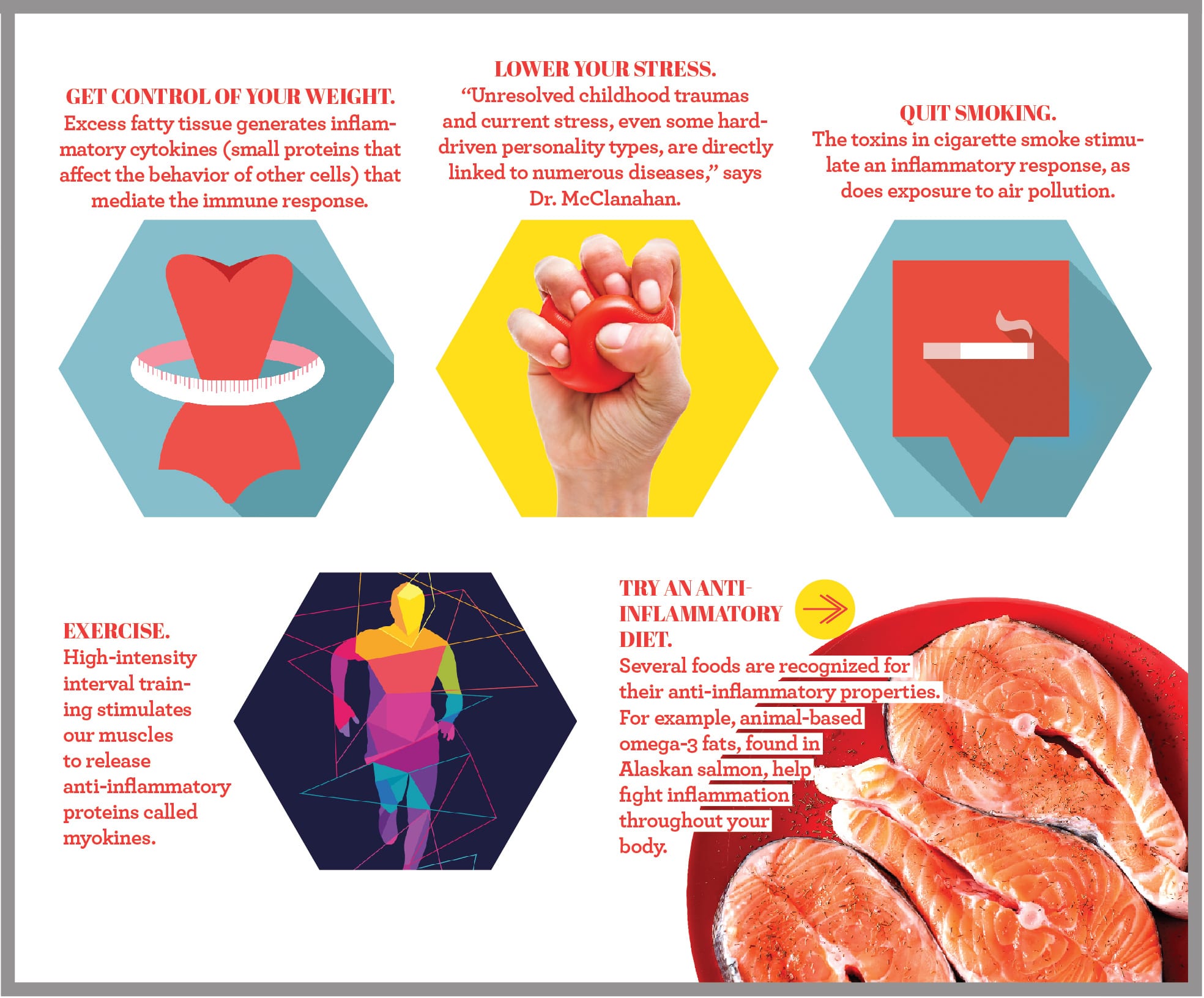By Camille Platt
When you sprain your ankle, stub your toe, or come down with a sinus infection, your immune system initiates a defense reaction: arteries dilate, blood flow increases, and a host of proteins and white blood cells gather at the site to initiate tissue repair.
This reaction is known as an acute inflammatory response, and it’s part of the body’s normal path to healing. It may cause temporary swelling, tenderness, fever, or redness, but it’s key – even necessary – for recovery.
“Inflammation is a normal immune response to real or perceived damage in an effort to repair the body and return to a balance point,” explains Dr. Matthew McClanahan, a family medicine physician with CHI Memorial Integrative Medicine Associates. Without inflammation, wounds would never heal. Infections would kill us.
But what if your body never quite gets the message the injury or insult is gone? What if low levels of inflammation remain in the body, unnoticed?
That’s a different story.
When Inflammation Goes Wrong
 Doctors and researchers separate inflammation into two categories: acute inflammation, the kind of inflammation described earlier, and chronic inflammation, a kind of inflammation that persists over time and may contribute to disease and damage.
Doctors and researchers separate inflammation into two categories: acute inflammation, the kind of inflammation described earlier, and chronic inflammation, a kind of inflammation that persists over time and may contribute to disease and damage.
Chronic inflammation is different from acute inflammation in that 1) it usually isn’t restricted to one area of your body, and 2) it simply won’t go away. When the immune system keeps leaking low levels of “first-responder” chemicals into the bloodstream over time, it can damage cells and tissues and contribute to, or exacerbate, a number of diseases.
Dr. McClanahan compares chronic inflammation to anxiety. “When we experience anxiety, we perceive we are in danger whether or not there is an actual danger, and the body stays in a constant state of high alert,” he says. “The same goes for chronic inflammation.”
Chronic inflammation may be caused by infections, abnormal immune reactions to normal tissues, conditions such as obesity, or even stress. However, in many cases, the cause of ongoing inflammation is unknown. Scientists are actively studying why it occurs, what it does, and how we can reverse it.
For example, scientists from Newcastle University’s Institute for Ageing and Keio University School of Medicine, Tokyo, recently studied groups of people aged 100 and over (centenarians) and their offspring. One of their key findings was that centenarian offspring maintained lower levels of markers for chronic inflammation. Additionally, those who kept inflammation levels low had the best chance of maintaining good cognition, independence, and longevity as they aged.
The Common Thread
In recent years, inflammation has become a hot topic in health due to new discoveries about the role it plays in a number of diseases. In fact, the Centers for Disease Control and Prevention keeps a list of the top ten leading causes of death—and half of them have been connected to chronic inflammation.
But here’s the burning question: Does chronic inflammation cause these conditions, result from them, or merely coincide with them? It’s hard to say. And it’s likely a little of each, which explains why some conditions are so hard to regulate. For example, people with chronic inflammation are more likely to become
insulin resistant, which promotes obesity. Yet excess body fat itself can trigger more inflammation. So the struggle is cyclical, as the conditions reinforce each other.
Ultimately, much more research is needed before we know how definitely inflammation plays a role in our health. While it’s clearly involved in a number of disease processes, we don’t yet have a grasp on how direct the relationship is.
The Link to Heart Disease and Stroke


Heart disease does begin when we acquire fatty deposits, or plaque, on the inner walls of our arteries. But after this happens, the body responds by sending inflammatory cells to the blood vessel walls. The resulting chronic inflammation causes further damage to artery walls and may cause plaque to rupture. This can trigger blood clots – which we know are the culprit behind heart attacks and strokes.
This new understanding of the role inflammation plays in heart disease has spurred new research on inflammatory markers for heart disease and the widespread use of a blood test call C-reactive protein. C-reactive protein is a biomarker for low-grade inflammation and can predict your risk of recurrent cardiovascular events.
The Link to Cancer
According to the National Cancer Institute, prolonged inflammation can damage DNA and lead to certain cancers. When precancerous tissues remain in a heightened state of alarm, normal cells are more likely to turn malignant.
Evidence linking chronic inflammation to all cancers is lacking. However, research shows patients who suffer from inflammatory bowel diseases like ulcerative colitis and Crohn’s disease have an increased risk of colon cancer. Similarly, many specialists believe chronic bladder inflammation elevates a patient’s risk of squamous cell bladder cancer.
Researchers have also discovered a clear connection between cigarette smoke, inflammation, and lung cancer. “Chronic irritation from tar and toxins induces chronic inflammation in small airways and tissues of your lungs,” says Kathy Dodd, family nurse practitioner with Parkridge Medical Group – Diagnostic Center. “This wears out their immune function at the cellular level and predisposes a person to lung cancer.”
Fighting Inflammation
Even though you may not be able to avoid chronic inflammation altogether, there are certainly things you can do to keep from stoking the flames.
People with poor health habits tend to have high higher levels of inflammation. So while we wait for science to catch up with all of our questions, here are a few ways to keep this immune response at a minimum:



